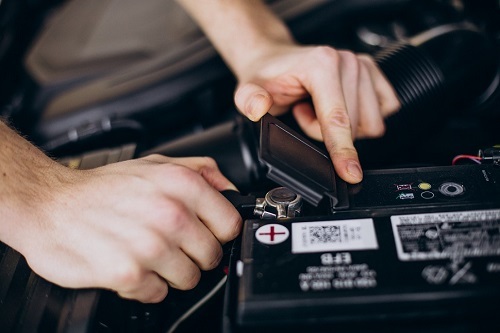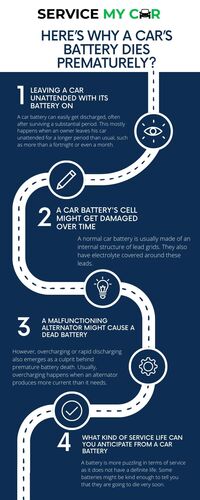Here’s Why A Car’s Battery Dies Prematurely?
Publicado por Joseph thomas
Cuerpo
You simply turn the key because you just want your car to arrive at your office in time for this crucial meeting. You anticipate hearing an engine start to crank, but nothing happens. It is what? Most likely, the battery is dead! How is this possible, though? When does a battery lose all of its charge in just a few years?
What kind of service life can you anticipate from a car battery?

However, a car battery’s lifespan is usually three to five years. A battery is more puzzling in terms of service as it does not have a definite life. Some batteries might be kind enough to tell you that they are going to die very soon. Others just surprise you.
Though it is a blessing to have the battery warning signs, there would always be time to react and avoid a failure on the road.
However, there is no doubt in fact that a car battery is not going to provide service whole life, however, it might be a short or longer as compare to other pieces of energy supply. There are a whole lot of reasons that might affect a battery's lifespan.
Even in ideal driving circumstances, using a battery past its five-year lifespan may result in an unexpected failure. Because of this, many manufacturers advise replacing these items every five years.
When a battery reaches the three-year mark, it is best to put in place some preventive measures, such as testing the battery once a year. It is more practical to have your battery checked when you are performing routine maintenance or before entering a season, especially winter.
Service My Car offers a quick test for your battery as well as its charging system so that you can rest assured that the battery and its supply of charging remain intact.
Why do car batteries become dead prematurely?

Usually, a car’s battery provides current to the starter so that it can turn over the engine. Additionally, it also provides current to the accessories in the absence of alternator current when the engine is not running. However, a battery needs to have at least 12.6 volts to be able to perform its duty, especially when starting a car.
However, there are some issues that might hamper the capacity of a battery that is often referred to as "dead."
1. Leaving a car unattended with its battery on
However, a car battery can easily get discharged, often after surviving a substantial period. This mostly happens when an owner leaves his car unattended for a longer period than usual, such as more than a fortnight or even a month.
The battery has a high tendency to lose its current over time; however, the parasitic discharge also plays a part here too. However, when a battery gets too discharged, it takes a lot of effort for the alternator to charge it back. It is also a time consuming process, and if it happens more than a few times, the battery can sustain damage.
In these times, you might also need a jump start, which might be a remedy to start a car but usually hampers the overall health of the battery, especially when someone opts for this more than a few times in a short span of time.
Therefore, multiple instances of deep discharging are not good for your car’s battery and often hurt it in the long run. The battery might lose its capacity to hold a charge.
This reduces the legitimate age of a car battery, and an owner has to go for a car battery replacement much earlier than the actual time.
2. A car battery's cell might get damaged over time
A normal car battery is usually made of an internal structure of lead grids. They also have electrolyte covered around these leads. However, these cells are quite robust, as they tolerate a number of challenges, whether they are car jerks or changes in temperature.
They deal with freezing winter nights and scorching day heat. Besides, they also deal with the engine heat consistently.
However, the excessive exposure to the heat, especially during those long trips, is one kind of risk to the battery cells. When the cells start to become dead, this is termed a structural issue.
On the other hand, it could be the low level of electrolyte. When there is a shortage of acid, one or more grids or cells specifically come into contact with air. The cells become damaged and often turn into dead cells that cannot hold current.
You might encounter a flat battery all of a sudden when it comes to the dead cells due to any reason. Visit Service My Car for an inspection of your battery.
3. A malfunctioning alternator might cause a dead battery
However, overcharging or rapid discharging also emerges as a culprit behind premature battery death. Usually, overcharging happens when an alternator produces more current than it needs. This causes the electrolyte to boil and leak, so you cannot expect the battery to work fine.
On the other hand, a non charging alternator might cause a battery to discharge rapidly, as all accessories might start to receive their current supply from the battery if the alternator breaks down.
In these cases, an owner is more responsible for the car's battery life than a mechanic or electrical issue. However, a problem such as an alternator problem is easy to fix by visiting a reliable workshop such as Service My Car. If you need any type of car service & repair, service my car provides you free pickup and delivery at the nearest nissan repair center.
However, these are your habits or attentive approach that can spare you from having a premature dead battery. Book a car service online or order a car repair quote online at our website or app.
What kind of service life can you anticipate from a car battery?

However, a car battery’s lifespan is usually three to five years. A battery is more puzzling in terms of service as it does not have a definite life. Some batteries might be kind enough to tell you that they are going to die very soon. Others just surprise you.
Though it is a blessing to have the battery warning signs, there would always be time to react and avoid a failure on the road.
However, there is no doubt in fact that a car battery is not going to provide service whole life, however, it might be a short or longer as compare to other pieces of energy supply. There are a whole lot of reasons that might affect a battery's lifespan.
Even in ideal driving circumstances, using a battery past its five-year lifespan may result in an unexpected failure. Because of this, many manufacturers advise replacing these items every five years.
When a battery reaches the three-year mark, it is best to put in place some preventive measures, such as testing the battery once a year. It is more practical to have your battery checked when you are performing routine maintenance or before entering a season, especially winter.
Service My Car offers a quick test for your battery as well as its charging system so that you can rest assured that the battery and its supply of charging remain intact.
Why do car batteries become dead prematurely?

Usually, a car’s battery provides current to the starter so that it can turn over the engine. Additionally, it also provides current to the accessories in the absence of alternator current when the engine is not running. However, a battery needs to have at least 12.6 volts to be able to perform its duty, especially when starting a car.
However, there are some issues that might hamper the capacity of a battery that is often referred to as "dead."
1. Leaving a car unattended with its battery on
However, a car battery can easily get discharged, often after surviving a substantial period. This mostly happens when an owner leaves his car unattended for a longer period than usual, such as more than a fortnight or even a month.
The battery has a high tendency to lose its current over time; however, the parasitic discharge also plays a part here too. However, when a battery gets too discharged, it takes a lot of effort for the alternator to charge it back. It is also a time consuming process, and if it happens more than a few times, the battery can sustain damage.
In these times, you might also need a jump start, which might be a remedy to start a car but usually hampers the overall health of the battery, especially when someone opts for this more than a few times in a short span of time.
Therefore, multiple instances of deep discharging are not good for your car’s battery and often hurt it in the long run. The battery might lose its capacity to hold a charge.
This reduces the legitimate age of a car battery, and an owner has to go for a car battery replacement much earlier than the actual time.
2. A car battery's cell might get damaged over time
A normal car battery is usually made of an internal structure of lead grids. They also have electrolyte covered around these leads. However, these cells are quite robust, as they tolerate a number of challenges, whether they are car jerks or changes in temperature.
They deal with freezing winter nights and scorching day heat. Besides, they also deal with the engine heat consistently.
However, the excessive exposure to the heat, especially during those long trips, is one kind of risk to the battery cells. When the cells start to become dead, this is termed a structural issue.
On the other hand, it could be the low level of electrolyte. When there is a shortage of acid, one or more grids or cells specifically come into contact with air. The cells become damaged and often turn into dead cells that cannot hold current.
You might encounter a flat battery all of a sudden when it comes to the dead cells due to any reason. Visit Service My Car for an inspection of your battery.
3. A malfunctioning alternator might cause a dead battery
However, overcharging or rapid discharging also emerges as a culprit behind premature battery death. Usually, overcharging happens when an alternator produces more current than it needs. This causes the electrolyte to boil and leak, so you cannot expect the battery to work fine.
On the other hand, a non charging alternator might cause a battery to discharge rapidly, as all accessories might start to receive their current supply from the battery if the alternator breaks down.
In these cases, an owner is more responsible for the car's battery life than a mechanic or electrical issue. However, a problem such as an alternator problem is easy to fix by visiting a reliable workshop such as Service My Car. If you need any type of car service & repair, service my car provides you free pickup and delivery at the nearest nissan repair center.
However, these are your habits or attentive approach that can spare you from having a premature dead battery. Book a car service online or order a car repair quote online at our website or app.












Comentarios